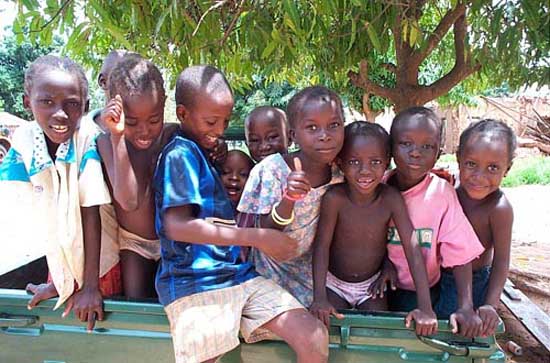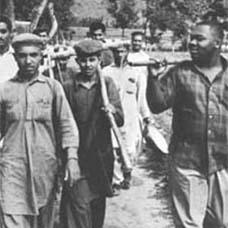
In one year, Ethiopia RPCV Philip Lilienthal's camps have brought in 781 young South Africans for 10-day or two-week sessions, at a combined cost of just $370,000.
His summer camps provide fun, games, and lessons about life and the epidemic
By John Donnelly, Globe Staff | January 24, 2005
MAGALIESBURG, South Africa -- Neo Pertunia, a 15-year-old girl from Soweto, recalls nervously packing for a 10-day summer camp this month, the longest she would ever be away from home.
ADVERTISEMENT
She stuffed two pairs of jeans, five T-shirts, and her beloved baby-blue high-top sneakers into a bag. And she carried with her the sound of her worried mother's voice, "Please take care of yourself, Neo."
Eight days into Camp Sizanani, founded by a man who ran a camp on remote Echo Lake in Maine for 30 years, the smiling teenager said she would leave a changed person. "When I get home, I'll teach my family everything I learned," Pertunia said. "There's so much to say. But I especially want to talk to my mother about sex. Before, I was afraid, but now I know I have to."
In the green hills northwest of Johannesburg, in the heat of the Southern Hemisphere's summer, a camp for children affected by AIDS has been a revelation for those from the dusty streets of Soweto, a sprawling urban township of more than 2.5 million people. The summer camp, a ritual for millions of American children, is a precious rarity in Africa. Here, the children have had their first taste of endless days of planned, fun-filled activities. And for an hour every day, they learn about AIDS and how to protect themselves.
It started one year ago because of one man's dream. Philip Lilienthal, 64, the former director of Camp Winnebago in Fayette, Maine, believed he "needed a challenge, to go where there was a need."
Leaving Camp Winnebago in the hands of his son, Andy, he opened operations in the epicenter of the AIDS pandemic, in a country where an estimated 5 million people are infected with HIV, the virus that causes AIDS. In one year, his camps have brought in 781 young South Africans for 10-day or two-week sessions, at a combined cost of just $370,000. Almost all the funding came from those on Lilienthal's long e-mail list, including families of his Maine campers and counselors.
Now he faces the challenge of getting more children in camp -- in South Africa, and eventually around the continent. He's soliciting contributions from corporations, foundations, and the US government, but securing more funds in the future is far from certain. Still, he hasn't let that stop him.
"I want to be all over Africa," said Lilienthal, a retired lawyer from Virginia and a Peace Corps volunteer in Ethiopia in the mid-1960s. "I've wanted to get back in Africa for 35 years and do stuff. Everyone thinks I'm so philanthropic and generous, but I'm not that at all. This is exactly what I want to be doing."
For Pertunia, whose aunt died of AIDS, Camp Sizanani (Zulu for "helping each other") has left her feeling more knowledgeable about AIDS and more confident to express her feelings.
ADVERTISEMENT
"I had my doubts about this camp. I thought maybe we would be sleeping in a forest, without blankets, and do hard things," she said during a lunch break this week. "But I've learned so much -- from different parts of male and female bodies, to swimming, to trusting other people."
She said trying to learn about sex in her Soweto neighborhood "is like a puzzle. You have all these pieces but don't know how to put them together. Now I know."
Her next challenge, she said, would be to talk about sexuality with her mother. "I have faith I can communicate with her," Pertunia said. "But in our culture, it's hard. It takes so long to get to the point."
Lilienthal formed the organization WorldCamps about 18 months ago without any funding or without any sure site to start the first camp. On a scouting trip to Africa, he met Michelle Schorn, the director of HIVSA, a South African nonprofit group that works with young people affected by AIDS, and the two agreed to work together. Schorn would locate the children, ages 10 to 15; some were from orphanages, while many others had a family member who either died of AIDS or is living with the virus. The camps would be single-sex, girls and boys alternating.
The camps, based on the Winnebago model, include swimming, arts and crafts, theater, music, and challenging outdoor activities. But the schedule diverts from the Maine camp in a significant way: a daily class on life skills focuses on AIDS, sexuality, and gender relations; teaching is tailored to the ages of the group.
The goal is to increase awareness about AIDS and "maybe save some lives," Lilienthal said.
But the experience has had other benefits, as well, causing some to change their behavior, he said.
"We thought the best we'd get is progress on AIDS," Lilienthal said. "We didn't expect much more out of 10 days. But these kids glom on to everything as if they are starved. They take anything they can get. It's just marvelous."
Fortunate Mathabela, 15, said she especially enjoyed activities that built trust among her peers. Standing in front of a 12-foot wall topped by a platform, counselors urged the teenagers to devise a plan to get all 19 of them over it.
One by one, the campers hoisted one another over the wall, to great applause with every success. "I wasn't nervous at all," Mathabela said afterward. "They must lift me over. I trust them."
At the end, counselor Katlego Skosana, 23, of Soweto, told them: "What you learned here doesn't end here. This is just the beginning. When you go home, that is when life really starts. Remember, guys, have fun all the way."
A fellow counselor, Chris Kolb, 23, of Kansas City, Mo., added, "If you can learn this, you can learn everything. See this huge wall? Think about it. If you work together as a team, you can do it. Nothing is too tough. You're tough, you're a team, you're powerful!"
He then led them in a single-word chant: "Power!" they shouted.
Afterward, Mathabela, who had scaled the wall, said the other campers in her cabin would likely discuss the accomplishment that night, after lights were out. Every night, she said, the nine of them stayed up till 1 a.m. talking, switching seamlessly from language to language.
Most of the girls know Zulu and English. Mathabela, whose primary language is Tsonga, speaks seven languages.
"We laugh, we talk, we tease each other," she said of the nighttime discussions. "We talk about AIDS and sex. I am very open to them. Even though I didn't know them before, they are good friends now."
The 114 campers from Soweto left for home this week on two school buses. It is always a tearful moment, said camp director Jacob Makgato, 23. "You feel a part of you is being taken away," he said.
But the experience is not meant to end there. For one thing, the camp encourages the children to attend gatherings in Soweto on two Saturdays every month, in hopes of reinforcing messages and friendships among them. And for another, Lilienthal, Makgato, and the counselors hope the few days of fun, camaraderie, and life lessons cause some to set new goals.
"I won't fully claim that we change lives in 10 days," Makgato said. "But we lay a foundation for that. At home, they hear many negative things, that they can't do this and can't do that. Here, we tell them different things; we tell them they can do things. The activities we do are not just for fun, but they are meant to be lifelong lessons."
For more information on WorldCamps, go to www.worldcamps.org.
John Donnelly can be reached at donnelly@globe.com.
© Copyright 2005 Globe Newspaper Company.











